InterContinental Hotels Group: Skills, Trends, and PESTLE Analysis
VerifiedAdded on 2023/06/04
|13
|4179
|304
Report
AI Summary
This report provides a comprehensive analysis of the contemporary hospitality industry, with a specific focus on the InterContinental Hotels Group (IHG). It begins by outlining various operational roles within the industry, such as event planners, executive chefs, general managers, and housekeepers, and then examines the essential skills required for these roles, as well as current skills shortages. The report further reviews the skills gaps within the industry and their impact on businesses, offering potential solutions to address these gaps. A significant portion of the report is dedicated to a PESTLE analysis, evaluating the political, economic, social, technological, legislative, and environmental factors influencing the development of hospitality organizations. The report then undertakes a SWOT analysis and evaluates the impact of external factors on the industry's development. Finally, the report assesses current and potential trends in the hospitality sector, evaluates IHG's ability to adapt to these trends, and analyzes how external factors influence these developments, providing specific examples to demonstrate the industry's evolution in response. The report concludes with a concise summary of the findings and recommendations.
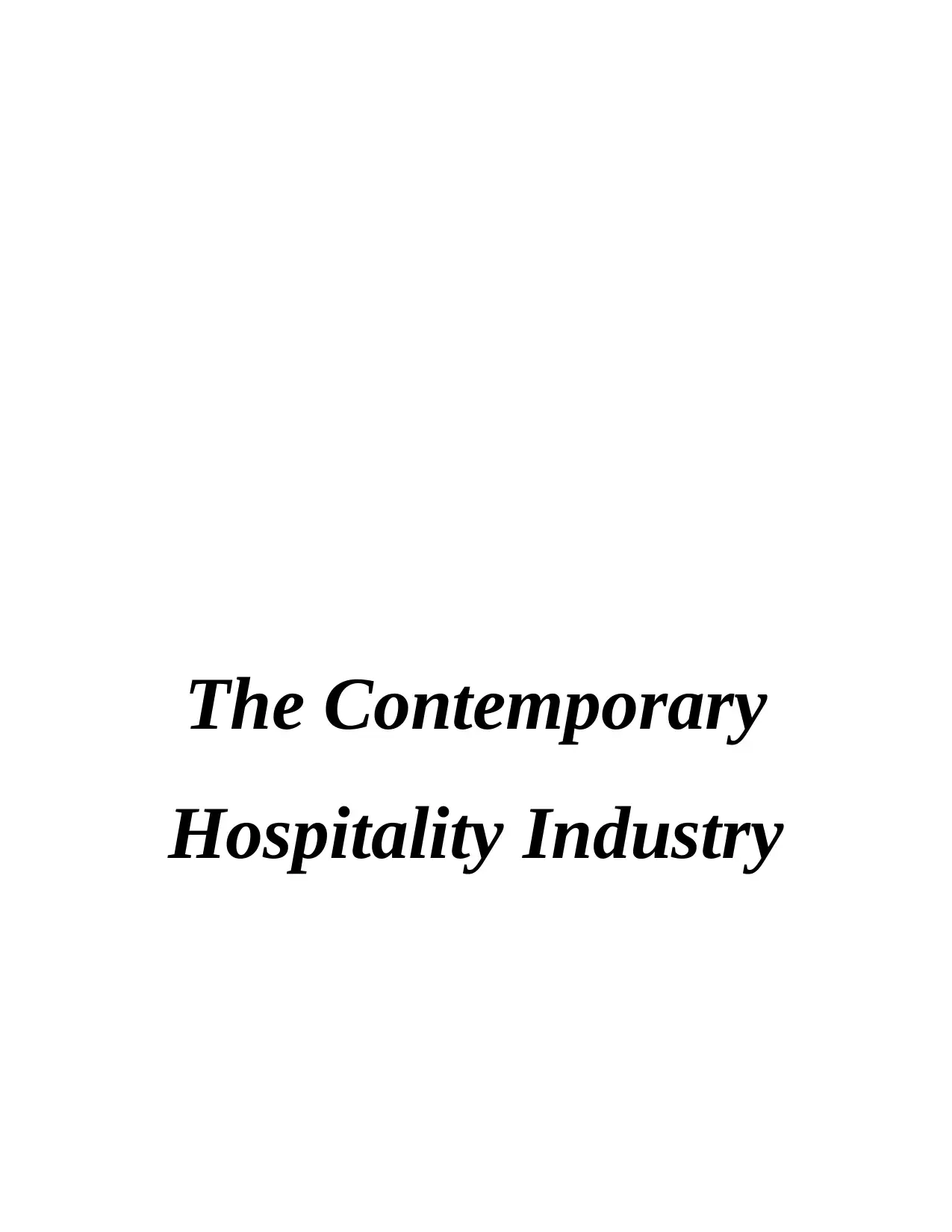
The Contemporary
Hospitality Industry
Hospitality Industry
Paraphrase This Document
Need a fresh take? Get an instant paraphrase of this document with our AI Paraphraser
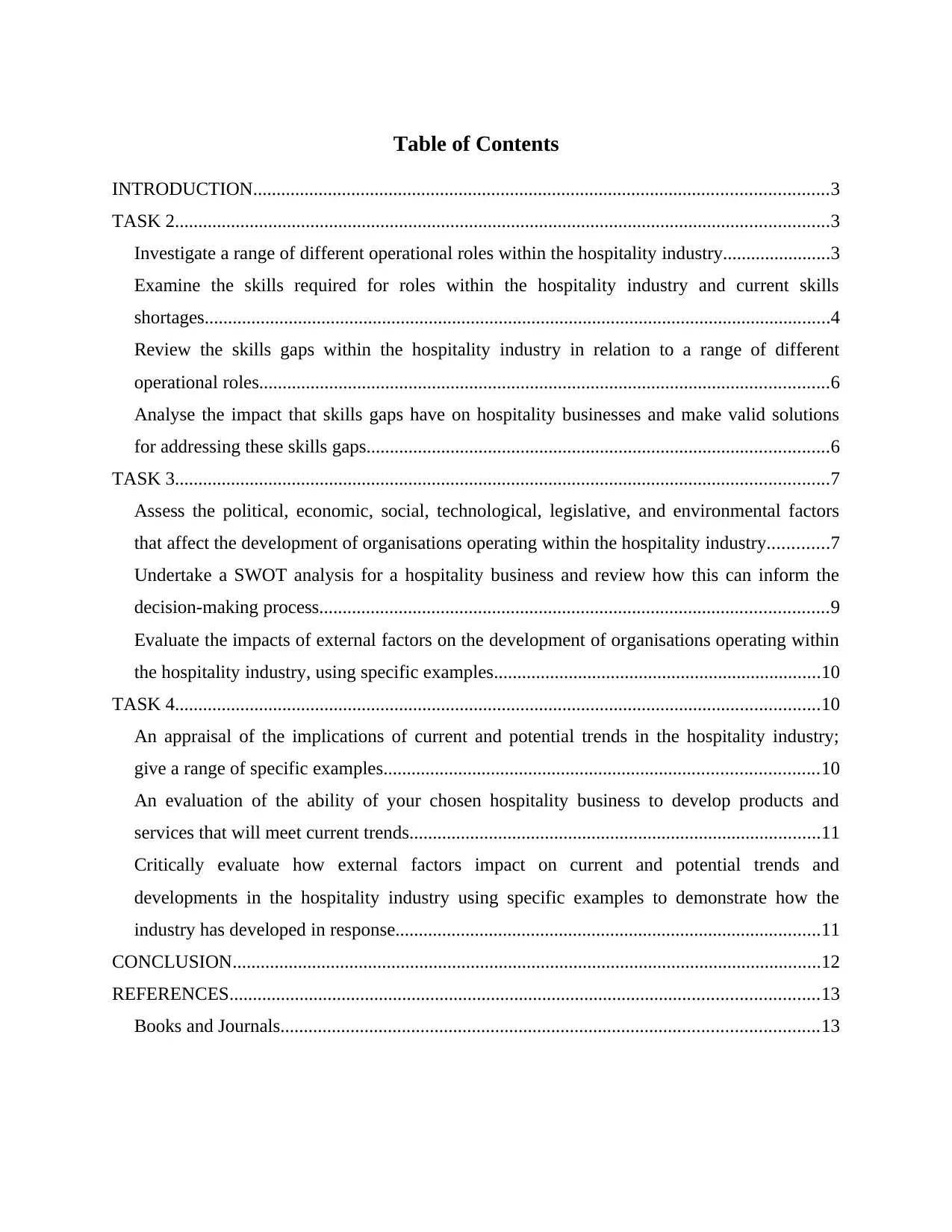
Table of Contents
INTRODUCTION...........................................................................................................................3
TASK 2............................................................................................................................................3
Investigate a range of different operational roles within the hospitality industry.......................3
Examine the skills required for roles within the hospitality industry and current skills
shortages......................................................................................................................................4
Review the skills gaps within the hospitality industry in relation to a range of different
operational roles..........................................................................................................................6
Analyse the impact that skills gaps have on hospitality businesses and make valid solutions
for addressing these skills gaps...................................................................................................6
TASK 3............................................................................................................................................7
Assess the political, economic, social, technological, legislative, and environmental factors
that affect the development of organisations operating within the hospitality industry.............7
Undertake a SWOT analysis for a hospitality business and review how this can inform the
decision-making process.............................................................................................................9
Evaluate the impacts of external factors on the development of organisations operating within
the hospitality industry, using specific examples......................................................................10
TASK 4..........................................................................................................................................10
An appraisal of the implications of current and potential trends in the hospitality industry;
give a range of specific examples.............................................................................................10
An evaluation of the ability of your chosen hospitality business to develop products and
services that will meet current trends........................................................................................11
Critically evaluate how external factors impact on current and potential trends and
developments in the hospitality industry using specific examples to demonstrate how the
industry has developed in response...........................................................................................11
CONCLUSION..............................................................................................................................12
REFERENCES..............................................................................................................................13
Books and Journals...................................................................................................................13
INTRODUCTION...........................................................................................................................3
TASK 2............................................................................................................................................3
Investigate a range of different operational roles within the hospitality industry.......................3
Examine the skills required for roles within the hospitality industry and current skills
shortages......................................................................................................................................4
Review the skills gaps within the hospitality industry in relation to a range of different
operational roles..........................................................................................................................6
Analyse the impact that skills gaps have on hospitality businesses and make valid solutions
for addressing these skills gaps...................................................................................................6
TASK 3............................................................................................................................................7
Assess the political, economic, social, technological, legislative, and environmental factors
that affect the development of organisations operating within the hospitality industry.............7
Undertake a SWOT analysis for a hospitality business and review how this can inform the
decision-making process.............................................................................................................9
Evaluate the impacts of external factors on the development of organisations operating within
the hospitality industry, using specific examples......................................................................10
TASK 4..........................................................................................................................................10
An appraisal of the implications of current and potential trends in the hospitality industry;
give a range of specific examples.............................................................................................10
An evaluation of the ability of your chosen hospitality business to develop products and
services that will meet current trends........................................................................................11
Critically evaluate how external factors impact on current and potential trends and
developments in the hospitality industry using specific examples to demonstrate how the
industry has developed in response...........................................................................................11
CONCLUSION..............................................................................................................................12
REFERENCES..............................................................................................................................13
Books and Journals...................................................................................................................13
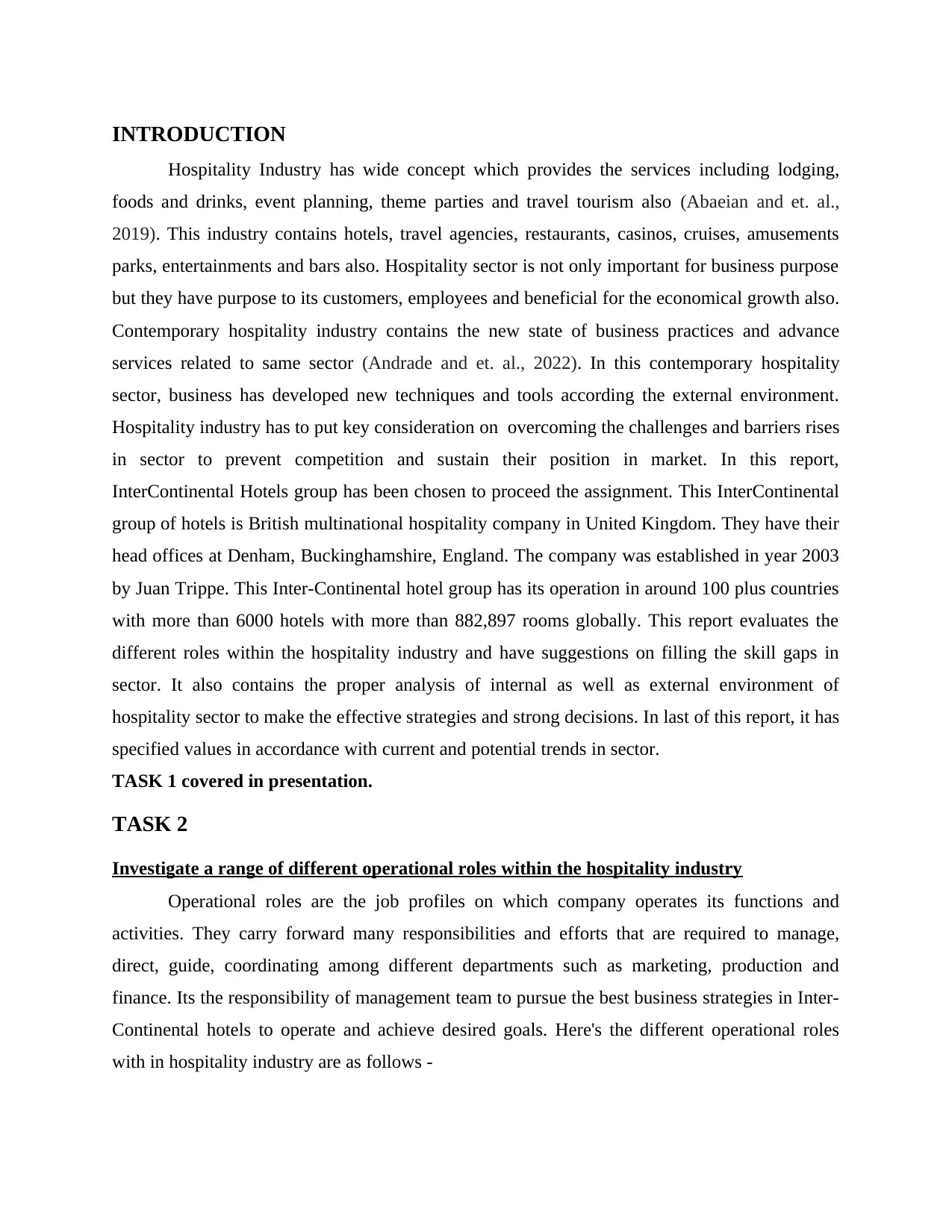
INTRODUCTION
Hospitality Industry has wide concept which provides the services including lodging,
foods and drinks, event planning, theme parties and travel tourism also (Abaeian and et. al.,
2019). This industry contains hotels, travel agencies, restaurants, casinos, cruises, amusements
parks, entertainments and bars also. Hospitality sector is not only important for business purpose
but they have purpose to its customers, employees and beneficial for the economical growth also.
Contemporary hospitality industry contains the new state of business practices and advance
services related to same sector (Andrade and et. al., 2022). In this contemporary hospitality
sector, business has developed new techniques and tools according the external environment.
Hospitality industry has to put key consideration on overcoming the challenges and barriers rises
in sector to prevent competition and sustain their position in market. In this report,
InterContinental Hotels group has been chosen to proceed the assignment. This InterContinental
group of hotels is British multinational hospitality company in United Kingdom. They have their
head offices at Denham, Buckinghamshire, England. The company was established in year 2003
by Juan Trippe. This Inter-Continental hotel group has its operation in around 100 plus countries
with more than 6000 hotels with more than 882,897 rooms globally. This report evaluates the
different roles within the hospitality industry and have suggestions on filling the skill gaps in
sector. It also contains the proper analysis of internal as well as external environment of
hospitality sector to make the effective strategies and strong decisions. In last of this report, it has
specified values in accordance with current and potential trends in sector.
TASK 1 covered in presentation.
TASK 2
Investigate a range of different operational roles within the hospitality industry
Operational roles are the job profiles on which company operates its functions and
activities. They carry forward many responsibilities and efforts that are required to manage,
direct, guide, coordinating among different departments such as marketing, production and
finance. Its the responsibility of management team to pursue the best business strategies in Inter-
Continental hotels to operate and achieve desired goals. Here's the different operational roles
with in hospitality industry are as follows -
Hospitality Industry has wide concept which provides the services including lodging,
foods and drinks, event planning, theme parties and travel tourism also (Abaeian and et. al.,
2019). This industry contains hotels, travel agencies, restaurants, casinos, cruises, amusements
parks, entertainments and bars also. Hospitality sector is not only important for business purpose
but they have purpose to its customers, employees and beneficial for the economical growth also.
Contemporary hospitality industry contains the new state of business practices and advance
services related to same sector (Andrade and et. al., 2022). In this contemporary hospitality
sector, business has developed new techniques and tools according the external environment.
Hospitality industry has to put key consideration on overcoming the challenges and barriers rises
in sector to prevent competition and sustain their position in market. In this report,
InterContinental Hotels group has been chosen to proceed the assignment. This InterContinental
group of hotels is British multinational hospitality company in United Kingdom. They have their
head offices at Denham, Buckinghamshire, England. The company was established in year 2003
by Juan Trippe. This Inter-Continental hotel group has its operation in around 100 plus countries
with more than 6000 hotels with more than 882,897 rooms globally. This report evaluates the
different roles within the hospitality industry and have suggestions on filling the skill gaps in
sector. It also contains the proper analysis of internal as well as external environment of
hospitality sector to make the effective strategies and strong decisions. In last of this report, it has
specified values in accordance with current and potential trends in sector.
TASK 1 covered in presentation.
TASK 2
Investigate a range of different operational roles within the hospitality industry
Operational roles are the job profiles on which company operates its functions and
activities. They carry forward many responsibilities and efforts that are required to manage,
direct, guide, coordinating among different departments such as marketing, production and
finance. Its the responsibility of management team to pursue the best business strategies in Inter-
Continental hotels to operate and achieve desired goals. Here's the different operational roles
with in hospitality industry are as follows -
⊘ This is a preview!⊘
Do you want full access?
Subscribe today to unlock all pages.

Trusted by 1+ million students worldwide
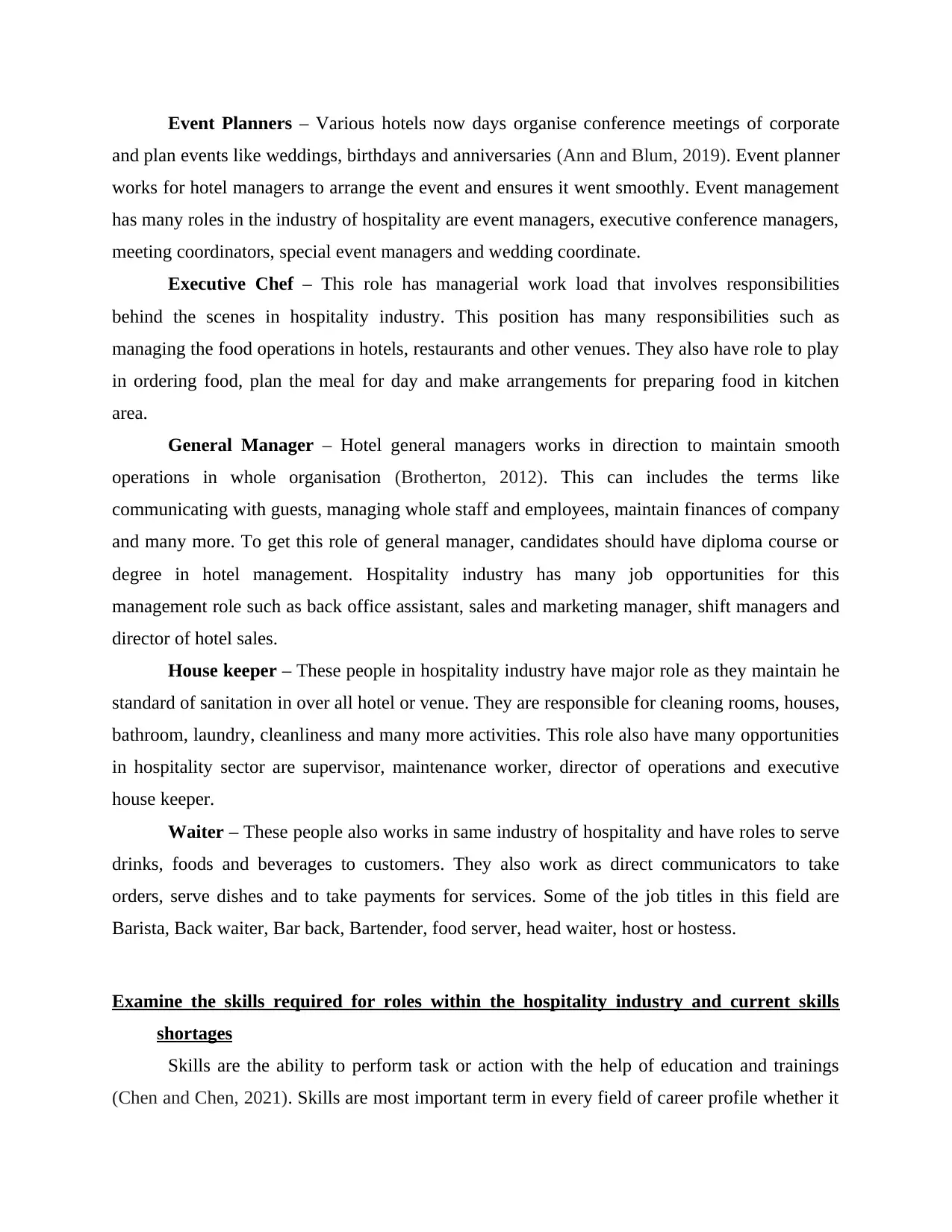
Event Planners – Various hotels now days organise conference meetings of corporate
and plan events like weddings, birthdays and anniversaries (Ann and Blum, 2019). Event planner
works for hotel managers to arrange the event and ensures it went smoothly. Event management
has many roles in the industry of hospitality are event managers, executive conference managers,
meeting coordinators, special event managers and wedding coordinate.
Executive Chef – This role has managerial work load that involves responsibilities
behind the scenes in hospitality industry. This position has many responsibilities such as
managing the food operations in hotels, restaurants and other venues. They also have role to play
in ordering food, plan the meal for day and make arrangements for preparing food in kitchen
area.
General Manager – Hotel general managers works in direction to maintain smooth
operations in whole organisation (Brotherton, 2012). This can includes the terms like
communicating with guests, managing whole staff and employees, maintain finances of company
and many more. To get this role of general manager, candidates should have diploma course or
degree in hotel management. Hospitality industry has many job opportunities for this
management role such as back office assistant, sales and marketing manager, shift managers and
director of hotel sales.
House keeper – These people in hospitality industry have major role as they maintain he
standard of sanitation in over all hotel or venue. They are responsible for cleaning rooms, houses,
bathroom, laundry, cleanliness and many more activities. This role also have many opportunities
in hospitality sector are supervisor, maintenance worker, director of operations and executive
house keeper.
Waiter – These people also works in same industry of hospitality and have roles to serve
drinks, foods and beverages to customers. They also work as direct communicators to take
orders, serve dishes and to take payments for services. Some of the job titles in this field are
Barista, Back waiter, Bar back, Bartender, food server, head waiter, host or hostess.
Examine the skills required for roles within the hospitality industry and current skills
shortages
Skills are the ability to perform task or action with the help of education and trainings
(Chen and Chen, 2021). Skills are most important term in every field of career profile whether it
and plan events like weddings, birthdays and anniversaries (Ann and Blum, 2019). Event planner
works for hotel managers to arrange the event and ensures it went smoothly. Event management
has many roles in the industry of hospitality are event managers, executive conference managers,
meeting coordinators, special event managers and wedding coordinate.
Executive Chef – This role has managerial work load that involves responsibilities
behind the scenes in hospitality industry. This position has many responsibilities such as
managing the food operations in hotels, restaurants and other venues. They also have role to play
in ordering food, plan the meal for day and make arrangements for preparing food in kitchen
area.
General Manager – Hotel general managers works in direction to maintain smooth
operations in whole organisation (Brotherton, 2012). This can includes the terms like
communicating with guests, managing whole staff and employees, maintain finances of company
and many more. To get this role of general manager, candidates should have diploma course or
degree in hotel management. Hospitality industry has many job opportunities for this
management role such as back office assistant, sales and marketing manager, shift managers and
director of hotel sales.
House keeper – These people in hospitality industry have major role as they maintain he
standard of sanitation in over all hotel or venue. They are responsible for cleaning rooms, houses,
bathroom, laundry, cleanliness and many more activities. This role also have many opportunities
in hospitality sector are supervisor, maintenance worker, director of operations and executive
house keeper.
Waiter – These people also works in same industry of hospitality and have roles to serve
drinks, foods and beverages to customers. They also work as direct communicators to take
orders, serve dishes and to take payments for services. Some of the job titles in this field are
Barista, Back waiter, Bar back, Bartender, food server, head waiter, host or hostess.
Examine the skills required for roles within the hospitality industry and current skills
shortages
Skills are the ability to perform task or action with the help of education and trainings
(Chen and Chen, 2021). Skills are most important term in every field of career profile whether it
Paraphrase This Document
Need a fresh take? Get an instant paraphrase of this document with our AI Paraphraser
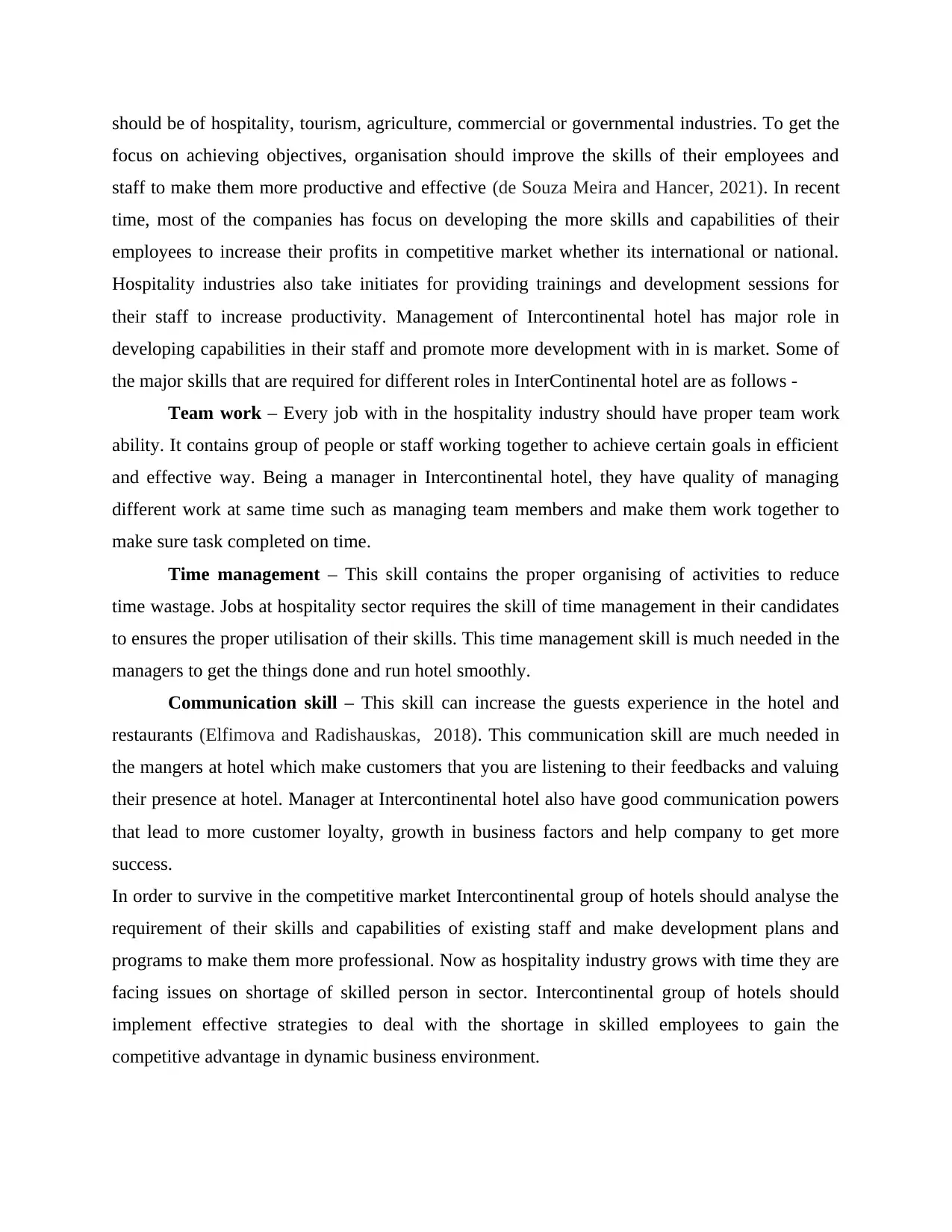
should be of hospitality, tourism, agriculture, commercial or governmental industries. To get the
focus on achieving objectives, organisation should improve the skills of their employees and
staff to make them more productive and effective (de Souza Meira and Hancer, 2021). In recent
time, most of the companies has focus on developing the more skills and capabilities of their
employees to increase their profits in competitive market whether its international or national.
Hospitality industries also take initiates for providing trainings and development sessions for
their staff to increase productivity. Management of Intercontinental hotel has major role in
developing capabilities in their staff and promote more development with in is market. Some of
the major skills that are required for different roles in InterContinental hotel are as follows -
Team work – Every job with in the hospitality industry should have proper team work
ability. It contains group of people or staff working together to achieve certain goals in efficient
and effective way. Being a manager in Intercontinental hotel, they have quality of managing
different work at same time such as managing team members and make them work together to
make sure task completed on time.
Time management – This skill contains the proper organising of activities to reduce
time wastage. Jobs at hospitality sector requires the skill of time management in their candidates
to ensures the proper utilisation of their skills. This time management skill is much needed in the
managers to get the things done and run hotel smoothly.
Communication skill – This skill can increase the guests experience in the hotel and
restaurants (Elfimova and Radishauskas, 2018). This communication skill are much needed in
the mangers at hotel which make customers that you are listening to their feedbacks and valuing
their presence at hotel. Manager at Intercontinental hotel also have good communication powers
that lead to more customer loyalty, growth in business factors and help company to get more
success.
In order to survive in the competitive market Intercontinental group of hotels should analyse the
requirement of their skills and capabilities of existing staff and make development plans and
programs to make them more professional. Now as hospitality industry grows with time they are
facing issues on shortage of skilled person in sector. Intercontinental group of hotels should
implement effective strategies to deal with the shortage in skilled employees to gain the
competitive advantage in dynamic business environment.
focus on achieving objectives, organisation should improve the skills of their employees and
staff to make them more productive and effective (de Souza Meira and Hancer, 2021). In recent
time, most of the companies has focus on developing the more skills and capabilities of their
employees to increase their profits in competitive market whether its international or national.
Hospitality industries also take initiates for providing trainings and development sessions for
their staff to increase productivity. Management of Intercontinental hotel has major role in
developing capabilities in their staff and promote more development with in is market. Some of
the major skills that are required for different roles in InterContinental hotel are as follows -
Team work – Every job with in the hospitality industry should have proper team work
ability. It contains group of people or staff working together to achieve certain goals in efficient
and effective way. Being a manager in Intercontinental hotel, they have quality of managing
different work at same time such as managing team members and make them work together to
make sure task completed on time.
Time management – This skill contains the proper organising of activities to reduce
time wastage. Jobs at hospitality sector requires the skill of time management in their candidates
to ensures the proper utilisation of their skills. This time management skill is much needed in the
managers to get the things done and run hotel smoothly.
Communication skill – This skill can increase the guests experience in the hotel and
restaurants (Elfimova and Radishauskas, 2018). This communication skill are much needed in
the mangers at hotel which make customers that you are listening to their feedbacks and valuing
their presence at hotel. Manager at Intercontinental hotel also have good communication powers
that lead to more customer loyalty, growth in business factors and help company to get more
success.
In order to survive in the competitive market Intercontinental group of hotels should analyse the
requirement of their skills and capabilities of existing staff and make development plans and
programs to make them more professional. Now as hospitality industry grows with time they are
facing issues on shortage of skilled person in sector. Intercontinental group of hotels should
implement effective strategies to deal with the shortage in skilled employees to gain the
competitive advantage in dynamic business environment.
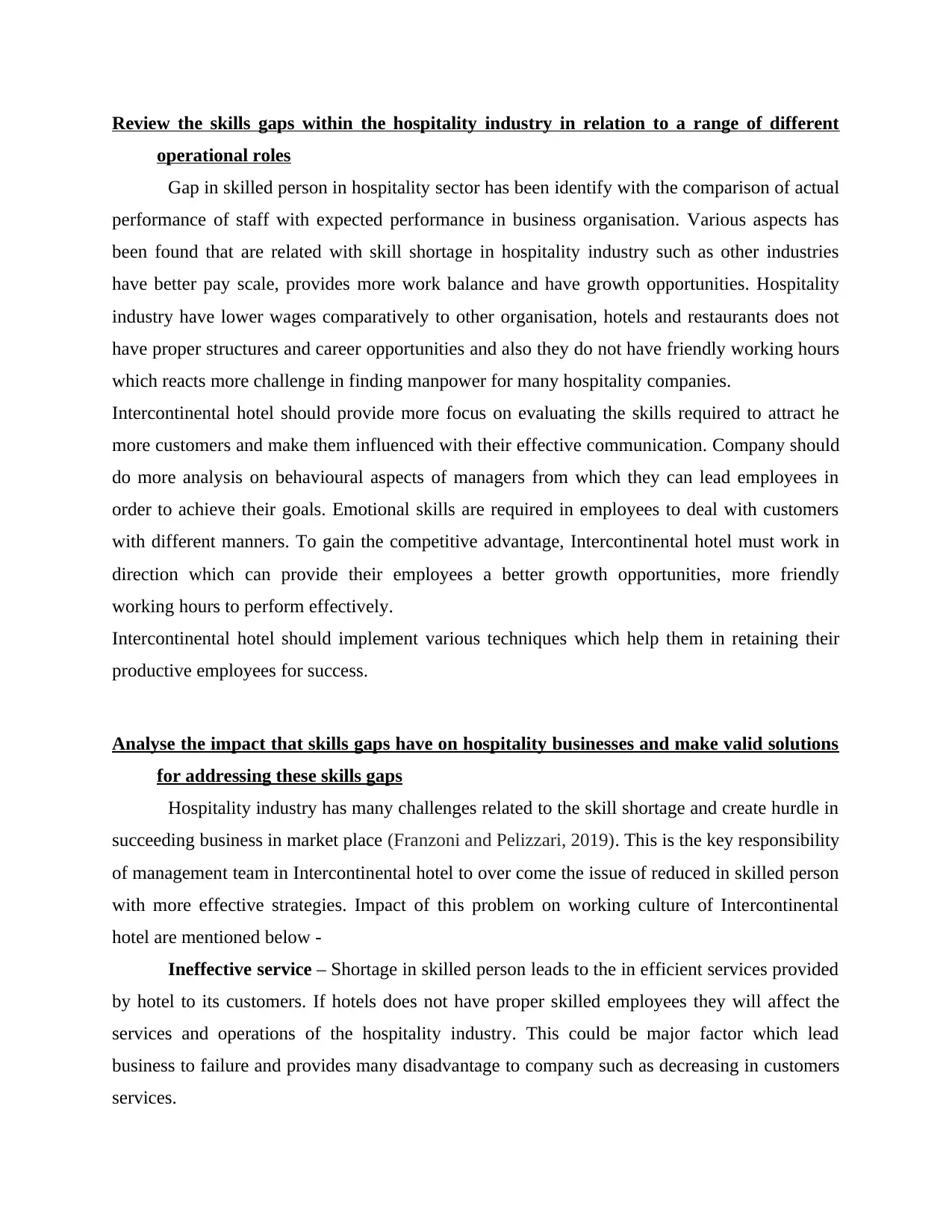
Review the skills gaps within the hospitality industry in relation to a range of different
operational roles
Gap in skilled person in hospitality sector has been identify with the comparison of actual
performance of staff with expected performance in business organisation. Various aspects has
been found that are related with skill shortage in hospitality industry such as other industries
have better pay scale, provides more work balance and have growth opportunities. Hospitality
industry have lower wages comparatively to other organisation, hotels and restaurants does not
have proper structures and career opportunities and also they do not have friendly working hours
which reacts more challenge in finding manpower for many hospitality companies.
Intercontinental hotel should provide more focus on evaluating the skills required to attract he
more customers and make them influenced with their effective communication. Company should
do more analysis on behavioural aspects of managers from which they can lead employees in
order to achieve their goals. Emotional skills are required in employees to deal with customers
with different manners. To gain the competitive advantage, Intercontinental hotel must work in
direction which can provide their employees a better growth opportunities, more friendly
working hours to perform effectively.
Intercontinental hotel should implement various techniques which help them in retaining their
productive employees for success.
Analyse the impact that skills gaps have on hospitality businesses and make valid solutions
for addressing these skills gaps
Hospitality industry has many challenges related to the skill shortage and create hurdle in
succeeding business in market place (Franzoni and Pelizzari, 2019). This is the key responsibility
of management team in Intercontinental hotel to over come the issue of reduced in skilled person
with more effective strategies. Impact of this problem on working culture of Intercontinental
hotel are mentioned below -
Ineffective service – Shortage in skilled person leads to the in efficient services provided
by hotel to its customers. If hotels does not have proper skilled employees they will affect the
services and operations of the hospitality industry. This could be major factor which lead
business to failure and provides many disadvantage to company such as decreasing in customers
services.
operational roles
Gap in skilled person in hospitality sector has been identify with the comparison of actual
performance of staff with expected performance in business organisation. Various aspects has
been found that are related with skill shortage in hospitality industry such as other industries
have better pay scale, provides more work balance and have growth opportunities. Hospitality
industry have lower wages comparatively to other organisation, hotels and restaurants does not
have proper structures and career opportunities and also they do not have friendly working hours
which reacts more challenge in finding manpower for many hospitality companies.
Intercontinental hotel should provide more focus on evaluating the skills required to attract he
more customers and make them influenced with their effective communication. Company should
do more analysis on behavioural aspects of managers from which they can lead employees in
order to achieve their goals. Emotional skills are required in employees to deal with customers
with different manners. To gain the competitive advantage, Intercontinental hotel must work in
direction which can provide their employees a better growth opportunities, more friendly
working hours to perform effectively.
Intercontinental hotel should implement various techniques which help them in retaining their
productive employees for success.
Analyse the impact that skills gaps have on hospitality businesses and make valid solutions
for addressing these skills gaps
Hospitality industry has many challenges related to the skill shortage and create hurdle in
succeeding business in market place (Franzoni and Pelizzari, 2019). This is the key responsibility
of management team in Intercontinental hotel to over come the issue of reduced in skilled person
with more effective strategies. Impact of this problem on working culture of Intercontinental
hotel are mentioned below -
Ineffective service – Shortage in skilled person leads to the in efficient services provided
by hotel to its customers. If hotels does not have proper skilled employees they will affect the
services and operations of the hospitality industry. This could be major factor which lead
business to failure and provides many disadvantage to company such as decreasing in customers
services.
⊘ This is a preview!⊘
Do you want full access?
Subscribe today to unlock all pages.

Trusted by 1+ million students worldwide
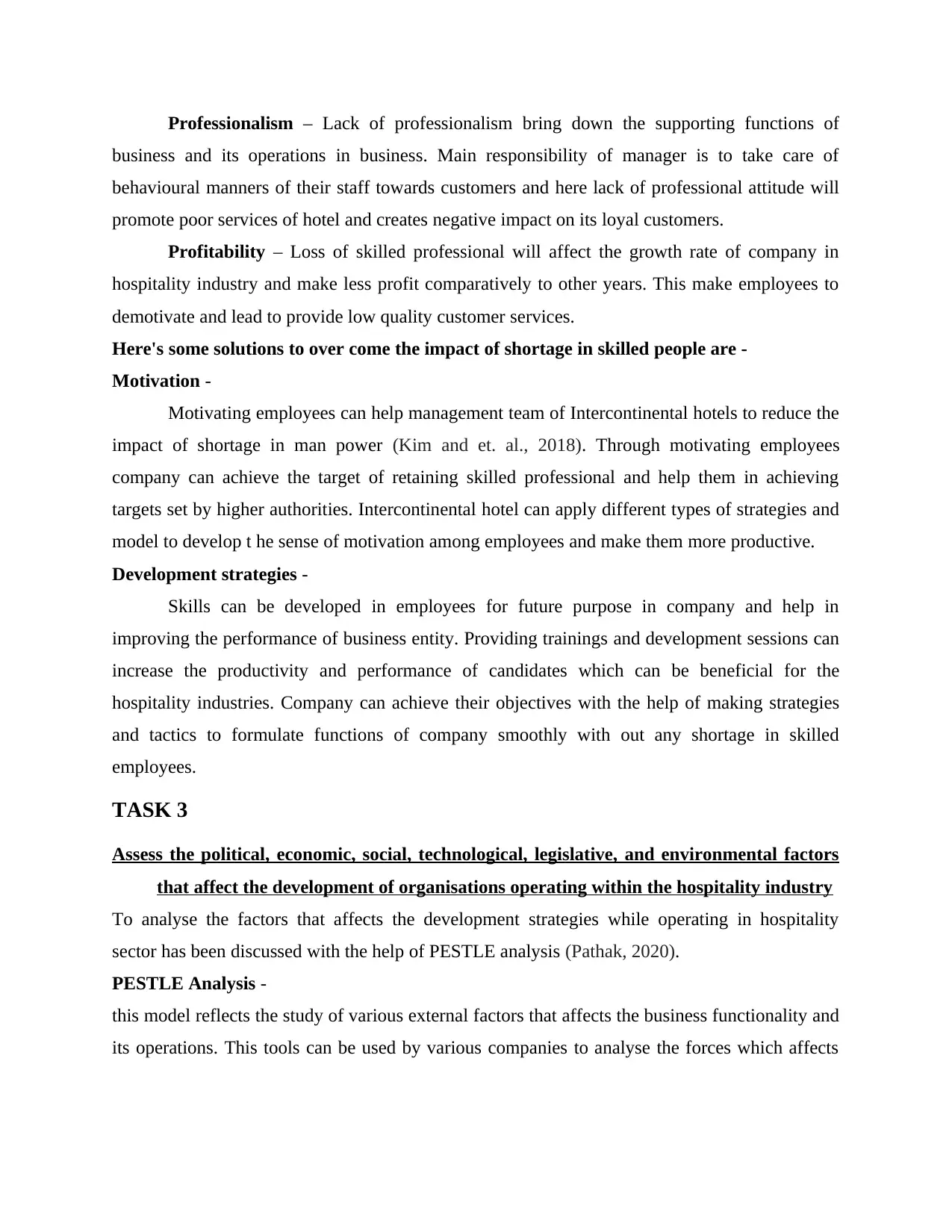
Professionalism – Lack of professionalism bring down the supporting functions of
business and its operations in business. Main responsibility of manager is to take care of
behavioural manners of their staff towards customers and here lack of professional attitude will
promote poor services of hotel and creates negative impact on its loyal customers.
Profitability – Loss of skilled professional will affect the growth rate of company in
hospitality industry and make less profit comparatively to other years. This make employees to
demotivate and lead to provide low quality customer services.
Here's some solutions to over come the impact of shortage in skilled people are -
Motivation -
Motivating employees can help management team of Intercontinental hotels to reduce the
impact of shortage in man power (Kim and et. al., 2018). Through motivating employees
company can achieve the target of retaining skilled professional and help them in achieving
targets set by higher authorities. Intercontinental hotel can apply different types of strategies and
model to develop t he sense of motivation among employees and make them more productive.
Development strategies -
Skills can be developed in employees for future purpose in company and help in
improving the performance of business entity. Providing trainings and development sessions can
increase the productivity and performance of candidates which can be beneficial for the
hospitality industries. Company can achieve their objectives with the help of making strategies
and tactics to formulate functions of company smoothly with out any shortage in skilled
employees.
TASK 3
Assess the political, economic, social, technological, legislative, and environmental factors
that affect the development of organisations operating within the hospitality industry
To analyse the factors that affects the development strategies while operating in hospitality
sector has been discussed with the help of PESTLE analysis (Pathak, 2020).
PESTLE Analysis -
this model reflects the study of various external factors that affects the business functionality and
its operations. This tools can be used by various companies to analyse the forces which affects
business and its operations in business. Main responsibility of manager is to take care of
behavioural manners of their staff towards customers and here lack of professional attitude will
promote poor services of hotel and creates negative impact on its loyal customers.
Profitability – Loss of skilled professional will affect the growth rate of company in
hospitality industry and make less profit comparatively to other years. This make employees to
demotivate and lead to provide low quality customer services.
Here's some solutions to over come the impact of shortage in skilled people are -
Motivation -
Motivating employees can help management team of Intercontinental hotels to reduce the
impact of shortage in man power (Kim and et. al., 2018). Through motivating employees
company can achieve the target of retaining skilled professional and help them in achieving
targets set by higher authorities. Intercontinental hotel can apply different types of strategies and
model to develop t he sense of motivation among employees and make them more productive.
Development strategies -
Skills can be developed in employees for future purpose in company and help in
improving the performance of business entity. Providing trainings and development sessions can
increase the productivity and performance of candidates which can be beneficial for the
hospitality industries. Company can achieve their objectives with the help of making strategies
and tactics to formulate functions of company smoothly with out any shortage in skilled
employees.
TASK 3
Assess the political, economic, social, technological, legislative, and environmental factors
that affect the development of organisations operating within the hospitality industry
To analyse the factors that affects the development strategies while operating in hospitality
sector has been discussed with the help of PESTLE analysis (Pathak, 2020).
PESTLE Analysis -
this model reflects the study of various external factors that affects the business functionality and
its operations. This tools can be used by various companies to analyse the forces which affects
Paraphrase This Document
Need a fresh take? Get an instant paraphrase of this document with our AI Paraphraser
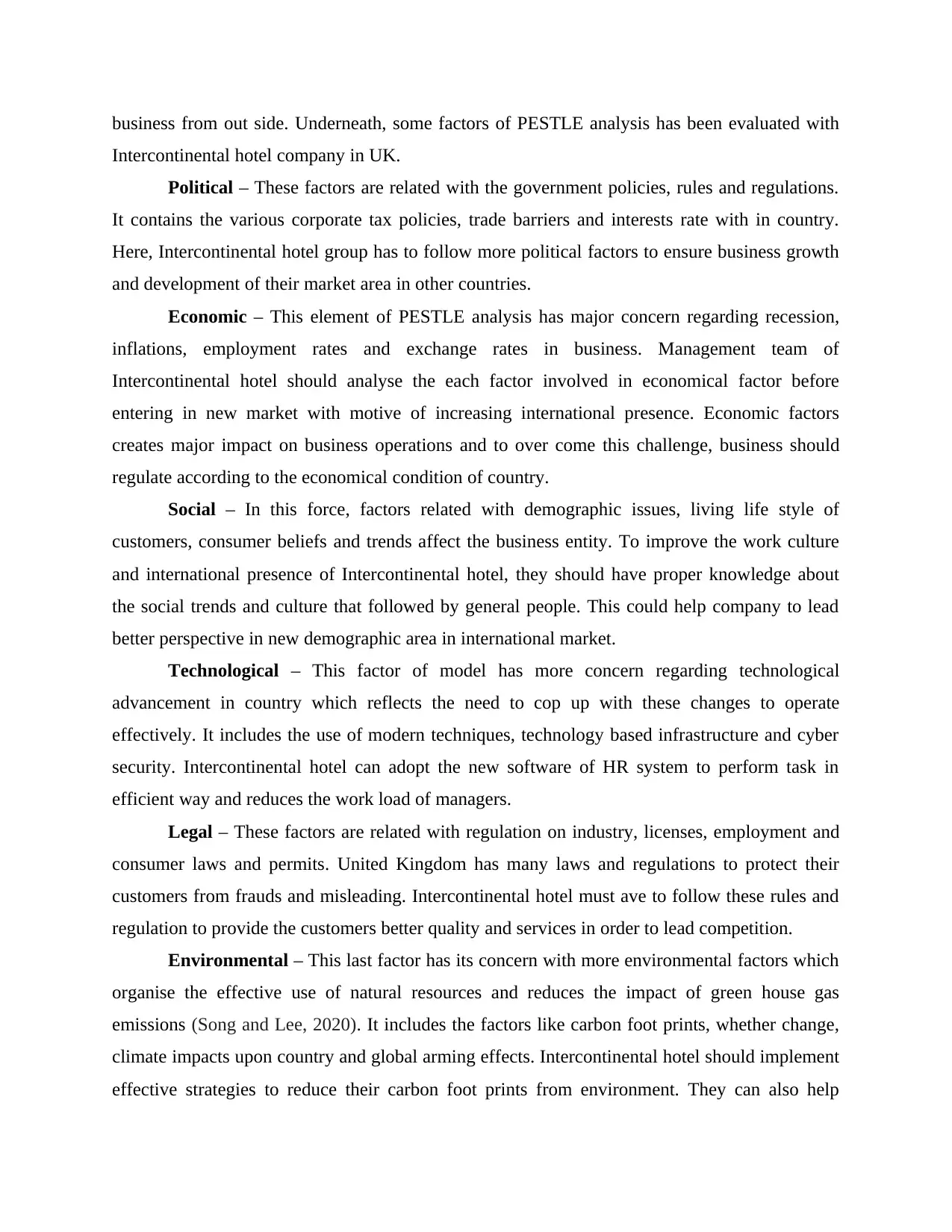
business from out side. Underneath, some factors of PESTLE analysis has been evaluated with
Intercontinental hotel company in UK.
Political – These factors are related with the government policies, rules and regulations.
It contains the various corporate tax policies, trade barriers and interests rate with in country.
Here, Intercontinental hotel group has to follow more political factors to ensure business growth
and development of their market area in other countries.
Economic – This element of PESTLE analysis has major concern regarding recession,
inflations, employment rates and exchange rates in business. Management team of
Intercontinental hotel should analyse the each factor involved in economical factor before
entering in new market with motive of increasing international presence. Economic factors
creates major impact on business operations and to over come this challenge, business should
regulate according to the economical condition of country.
Social – In this force, factors related with demographic issues, living life style of
customers, consumer beliefs and trends affect the business entity. To improve the work culture
and international presence of Intercontinental hotel, they should have proper knowledge about
the social trends and culture that followed by general people. This could help company to lead
better perspective in new demographic area in international market.
Technological – This factor of model has more concern regarding technological
advancement in country which reflects the need to cop up with these changes to operate
effectively. It includes the use of modern techniques, technology based infrastructure and cyber
security. Intercontinental hotel can adopt the new software of HR system to perform task in
efficient way and reduces the work load of managers.
Legal – These factors are related with regulation on industry, licenses, employment and
consumer laws and permits. United Kingdom has many laws and regulations to protect their
customers from frauds and misleading. Intercontinental hotel must ave to follow these rules and
regulation to provide the customers better quality and services in order to lead competition.
Environmental – This last factor has its concern with more environmental factors which
organise the effective use of natural resources and reduces the impact of green house gas
emissions (Song and Lee, 2020). It includes the factors like carbon foot prints, whether change,
climate impacts upon country and global arming effects. Intercontinental hotel should implement
effective strategies to reduce their carbon foot prints from environment. They can also help
Intercontinental hotel company in UK.
Political – These factors are related with the government policies, rules and regulations.
It contains the various corporate tax policies, trade barriers and interests rate with in country.
Here, Intercontinental hotel group has to follow more political factors to ensure business growth
and development of their market area in other countries.
Economic – This element of PESTLE analysis has major concern regarding recession,
inflations, employment rates and exchange rates in business. Management team of
Intercontinental hotel should analyse the each factor involved in economical factor before
entering in new market with motive of increasing international presence. Economic factors
creates major impact on business operations and to over come this challenge, business should
regulate according to the economical condition of country.
Social – In this force, factors related with demographic issues, living life style of
customers, consumer beliefs and trends affect the business entity. To improve the work culture
and international presence of Intercontinental hotel, they should have proper knowledge about
the social trends and culture that followed by general people. This could help company to lead
better perspective in new demographic area in international market.
Technological – This factor of model has more concern regarding technological
advancement in country which reflects the need to cop up with these changes to operate
effectively. It includes the use of modern techniques, technology based infrastructure and cyber
security. Intercontinental hotel can adopt the new software of HR system to perform task in
efficient way and reduces the work load of managers.
Legal – These factors are related with regulation on industry, licenses, employment and
consumer laws and permits. United Kingdom has many laws and regulations to protect their
customers from frauds and misleading. Intercontinental hotel must ave to follow these rules and
regulation to provide the customers better quality and services in order to lead competition.
Environmental – This last factor has its concern with more environmental factors which
organise the effective use of natural resources and reduces the impact of green house gas
emissions (Song and Lee, 2020). It includes the factors like carbon foot prints, whether change,
climate impacts upon country and global arming effects. Intercontinental hotel should implement
effective strategies to reduce their carbon foot prints from environment. They can also help
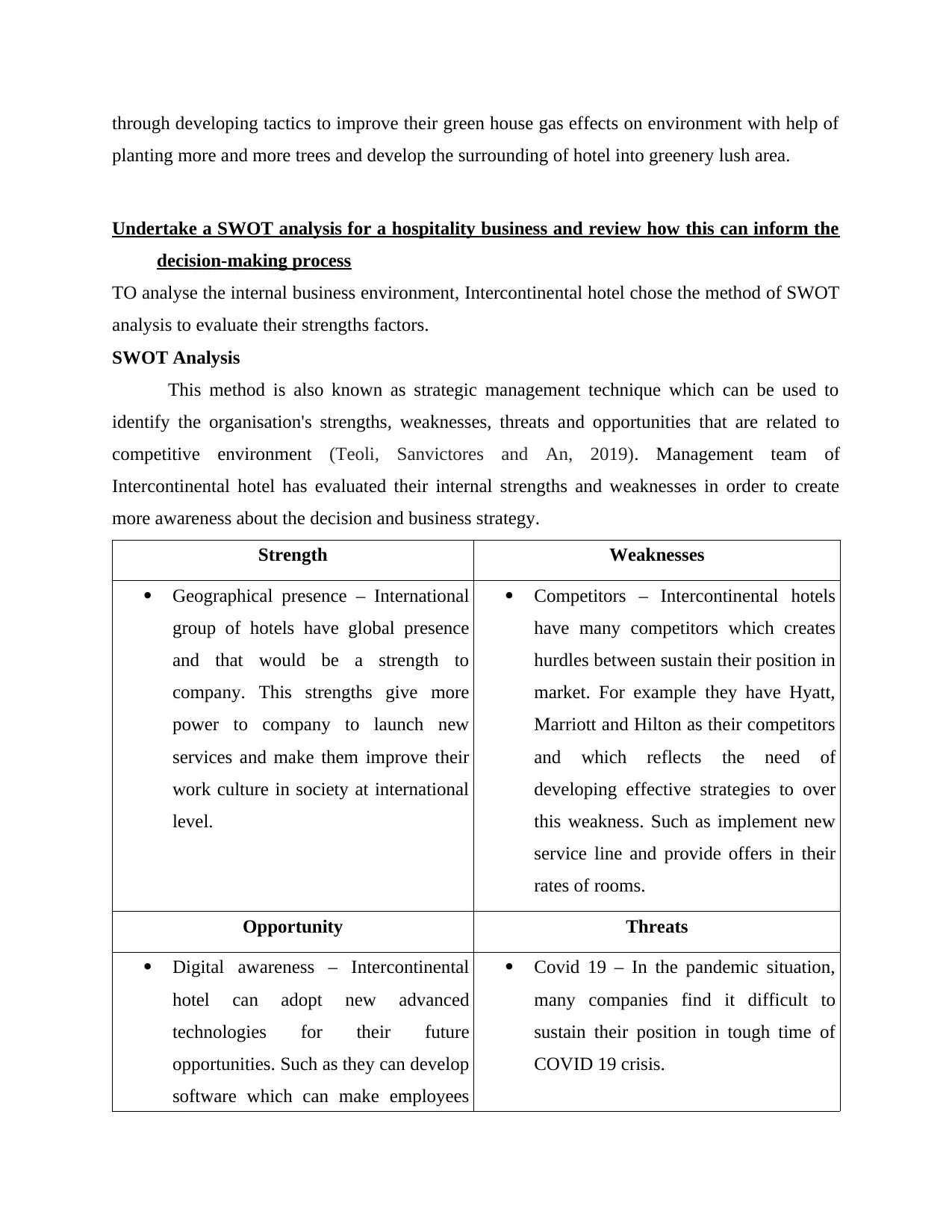
through developing tactics to improve their green house gas effects on environment with help of
planting more and more trees and develop the surrounding of hotel into greenery lush area.
Undertake a SWOT analysis for a hospitality business and review how this can inform the
decision-making process
TO analyse the internal business environment, Intercontinental hotel chose the method of SWOT
analysis to evaluate their strengths factors.
SWOT Analysis
This method is also known as strategic management technique which can be used to
identify the organisation's strengths, weaknesses, threats and opportunities that are related to
competitive environment (Teoli, Sanvictores and An, 2019). Management team of
Intercontinental hotel has evaluated their internal strengths and weaknesses in order to create
more awareness about the decision and business strategy.
Strength Weaknesses
Geographical presence – International
group of hotels have global presence
and that would be a strength to
company. This strengths give more
power to company to launch new
services and make them improve their
work culture in society at international
level.
Competitors – Intercontinental hotels
have many competitors which creates
hurdles between sustain their position in
market. For example they have Hyatt,
Marriott and Hilton as their competitors
and which reflects the need of
developing effective strategies to over
this weakness. Such as implement new
service line and provide offers in their
rates of rooms.
Opportunity Threats
Digital awareness – Intercontinental
hotel can adopt new advanced
technologies for their future
opportunities. Such as they can develop
software which can make employees
Covid 19 – In the pandemic situation,
many companies find it difficult to
sustain their position in tough time of
COVID 19 crisis.
planting more and more trees and develop the surrounding of hotel into greenery lush area.
Undertake a SWOT analysis for a hospitality business and review how this can inform the
decision-making process
TO analyse the internal business environment, Intercontinental hotel chose the method of SWOT
analysis to evaluate their strengths factors.
SWOT Analysis
This method is also known as strategic management technique which can be used to
identify the organisation's strengths, weaknesses, threats and opportunities that are related to
competitive environment (Teoli, Sanvictores and An, 2019). Management team of
Intercontinental hotel has evaluated their internal strengths and weaknesses in order to create
more awareness about the decision and business strategy.
Strength Weaknesses
Geographical presence – International
group of hotels have global presence
and that would be a strength to
company. This strengths give more
power to company to launch new
services and make them improve their
work culture in society at international
level.
Competitors – Intercontinental hotels
have many competitors which creates
hurdles between sustain their position in
market. For example they have Hyatt,
Marriott and Hilton as their competitors
and which reflects the need of
developing effective strategies to over
this weakness. Such as implement new
service line and provide offers in their
rates of rooms.
Opportunity Threats
Digital awareness – Intercontinental
hotel can adopt new advanced
technologies for their future
opportunities. Such as they can develop
software which can make employees
Covid 19 – In the pandemic situation,
many companies find it difficult to
sustain their position in tough time of
COVID 19 crisis.
⊘ This is a preview!⊘
Do you want full access?
Subscribe today to unlock all pages.

Trusted by 1+ million students worldwide
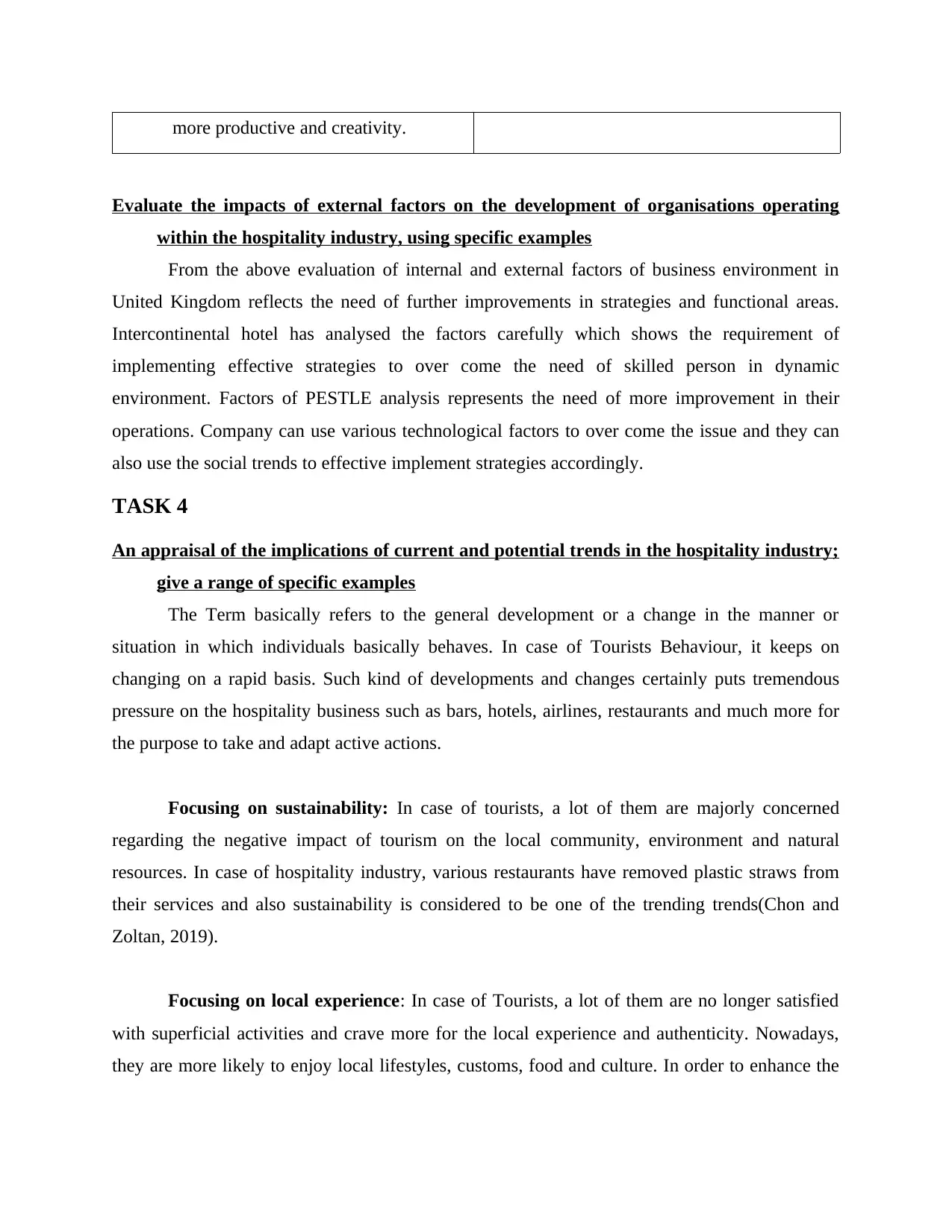
more productive and creativity.
Evaluate the impacts of external factors on the development of organisations operating
within the hospitality industry, using specific examples
From the above evaluation of internal and external factors of business environment in
United Kingdom reflects the need of further improvements in strategies and functional areas.
Intercontinental hotel has analysed the factors carefully which shows the requirement of
implementing effective strategies to over come the need of skilled person in dynamic
environment. Factors of PESTLE analysis represents the need of more improvement in their
operations. Company can use various technological factors to over come the issue and they can
also use the social trends to effective implement strategies accordingly.
TASK 4
An appraisal of the implications of current and potential trends in the hospitality industry;
give a range of specific examples
The Term basically refers to the general development or a change in the manner or
situation in which individuals basically behaves. In case of Tourists Behaviour, it keeps on
changing on a rapid basis. Such kind of developments and changes certainly puts tremendous
pressure on the hospitality business such as bars, hotels, airlines, restaurants and much more for
the purpose to take and adapt active actions.
Focusing on sustainability: In case of tourists, a lot of them are majorly concerned
regarding the negative impact of tourism on the local community, environment and natural
resources. In case of hospitality industry, various restaurants have removed plastic straws from
their services and also sustainability is considered to be one of the trending trends(Chon and
Zoltan, 2019).
Focusing on local experience: In case of Tourists, a lot of them are no longer satisfied
with superficial activities and crave more for the local experience and authenticity. Nowadays,
they are more likely to enjoy local lifestyles, customs, food and culture. In order to enhance the
Evaluate the impacts of external factors on the development of organisations operating
within the hospitality industry, using specific examples
From the above evaluation of internal and external factors of business environment in
United Kingdom reflects the need of further improvements in strategies and functional areas.
Intercontinental hotel has analysed the factors carefully which shows the requirement of
implementing effective strategies to over come the need of skilled person in dynamic
environment. Factors of PESTLE analysis represents the need of more improvement in their
operations. Company can use various technological factors to over come the issue and they can
also use the social trends to effective implement strategies accordingly.
TASK 4
An appraisal of the implications of current and potential trends in the hospitality industry;
give a range of specific examples
The Term basically refers to the general development or a change in the manner or
situation in which individuals basically behaves. In case of Tourists Behaviour, it keeps on
changing on a rapid basis. Such kind of developments and changes certainly puts tremendous
pressure on the hospitality business such as bars, hotels, airlines, restaurants and much more for
the purpose to take and adapt active actions.
Focusing on sustainability: In case of tourists, a lot of them are majorly concerned
regarding the negative impact of tourism on the local community, environment and natural
resources. In case of hospitality industry, various restaurants have removed plastic straws from
their services and also sustainability is considered to be one of the trending trends(Chon and
Zoltan, 2019).
Focusing on local experience: In case of Tourists, a lot of them are no longer satisfied
with superficial activities and crave more for the local experience and authenticity. Nowadays,
they are more likely to enjoy local lifestyles, customs, food and culture. In order to enhance the
Paraphrase This Document
Need a fresh take? Get an instant paraphrase of this document with our AI Paraphraser
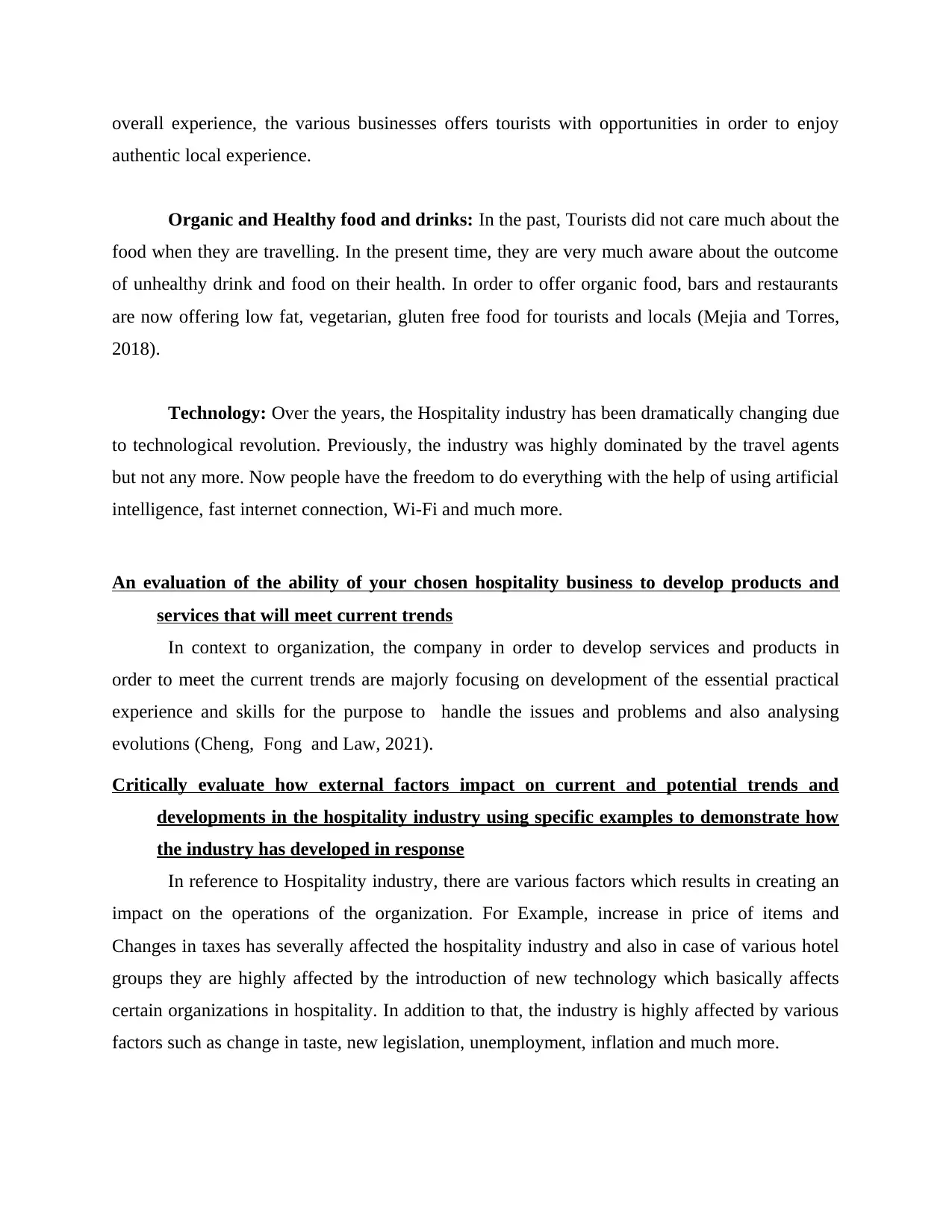
overall experience, the various businesses offers tourists with opportunities in order to enjoy
authentic local experience.
Organic and Healthy food and drinks: In the past, Tourists did not care much about the
food when they are travelling. In the present time, they are very much aware about the outcome
of unhealthy drink and food on their health. In order to offer organic food, bars and restaurants
are now offering low fat, vegetarian, gluten free food for tourists and locals (Mejia and Torres,
2018).
Technology: Over the years, the Hospitality industry has been dramatically changing due
to technological revolution. Previously, the industry was highly dominated by the travel agents
but not any more. Now people have the freedom to do everything with the help of using artificial
intelligence, fast internet connection, Wi-Fi and much more.
An evaluation of the ability of your chosen hospitality business to develop products and
services that will meet current trends
In context to organization, the company in order to develop services and products in
order to meet the current trends are majorly focusing on development of the essential practical
experience and skills for the purpose to handle the issues and problems and also analysing
evolutions (Cheng, Fong and Law, 2021).
Critically evaluate how external factors impact on current and potential trends and
developments in the hospitality industry using specific examples to demonstrate how
the industry has developed in response
In reference to Hospitality industry, there are various factors which results in creating an
impact on the operations of the organization. For Example, increase in price of items and
Changes in taxes has severally affected the hospitality industry and also in case of various hotel
groups they are highly affected by the introduction of new technology which basically affects
certain organizations in hospitality. In addition to that, the industry is highly affected by various
factors such as change in taste, new legislation, unemployment, inflation and much more.
authentic local experience.
Organic and Healthy food and drinks: In the past, Tourists did not care much about the
food when they are travelling. In the present time, they are very much aware about the outcome
of unhealthy drink and food on their health. In order to offer organic food, bars and restaurants
are now offering low fat, vegetarian, gluten free food for tourists and locals (Mejia and Torres,
2018).
Technology: Over the years, the Hospitality industry has been dramatically changing due
to technological revolution. Previously, the industry was highly dominated by the travel agents
but not any more. Now people have the freedom to do everything with the help of using artificial
intelligence, fast internet connection, Wi-Fi and much more.
An evaluation of the ability of your chosen hospitality business to develop products and
services that will meet current trends
In context to organization, the company in order to develop services and products in
order to meet the current trends are majorly focusing on development of the essential practical
experience and skills for the purpose to handle the issues and problems and also analysing
evolutions (Cheng, Fong and Law, 2021).
Critically evaluate how external factors impact on current and potential trends and
developments in the hospitality industry using specific examples to demonstrate how
the industry has developed in response
In reference to Hospitality industry, there are various factors which results in creating an
impact on the operations of the organization. For Example, increase in price of items and
Changes in taxes has severally affected the hospitality industry and also in case of various hotel
groups they are highly affected by the introduction of new technology which basically affects
certain organizations in hospitality. In addition to that, the industry is highly affected by various
factors such as change in taste, new legislation, unemployment, inflation and much more.
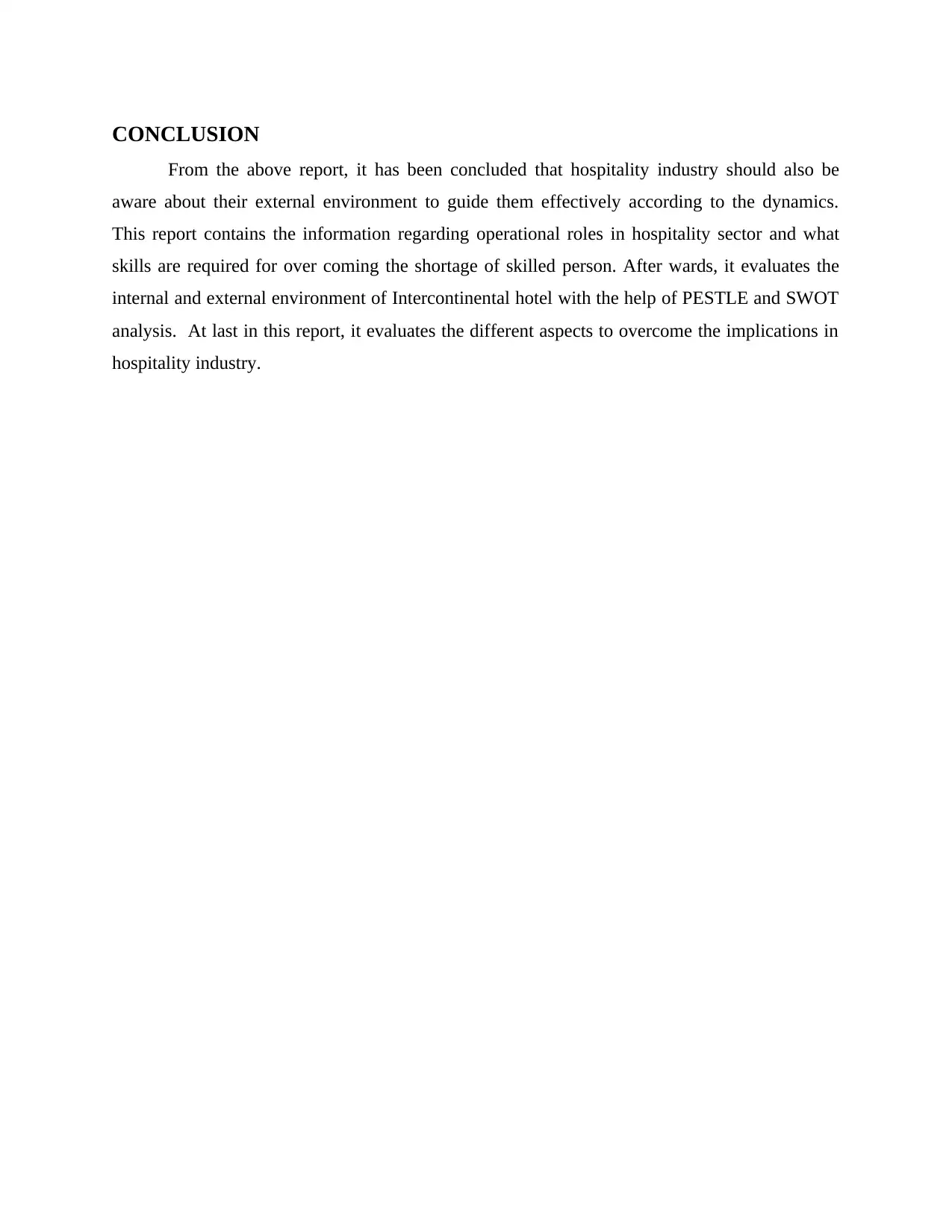
CONCLUSION
From the above report, it has been concluded that hospitality industry should also be
aware about their external environment to guide them effectively according to the dynamics.
This report contains the information regarding operational roles in hospitality sector and what
skills are required for over coming the shortage of skilled person. After wards, it evaluates the
internal and external environment of Intercontinental hotel with the help of PESTLE and SWOT
analysis. At last in this report, it evaluates the different aspects to overcome the implications in
hospitality industry.
From the above report, it has been concluded that hospitality industry should also be
aware about their external environment to guide them effectively according to the dynamics.
This report contains the information regarding operational roles in hospitality sector and what
skills are required for over coming the shortage of skilled person. After wards, it evaluates the
internal and external environment of Intercontinental hotel with the help of PESTLE and SWOT
analysis. At last in this report, it evaluates the different aspects to overcome the implications in
hospitality industry.
⊘ This is a preview!⊘
Do you want full access?
Subscribe today to unlock all pages.

Trusted by 1+ million students worldwide
1 out of 13
Related Documents
Your All-in-One AI-Powered Toolkit for Academic Success.
+13062052269
info@desklib.com
Available 24*7 on WhatsApp / Email
![[object Object]](/_next/static/media/star-bottom.7253800d.svg)
Unlock your academic potential
Copyright © 2020–2026 A2Z Services. All Rights Reserved. Developed and managed by ZUCOL.




